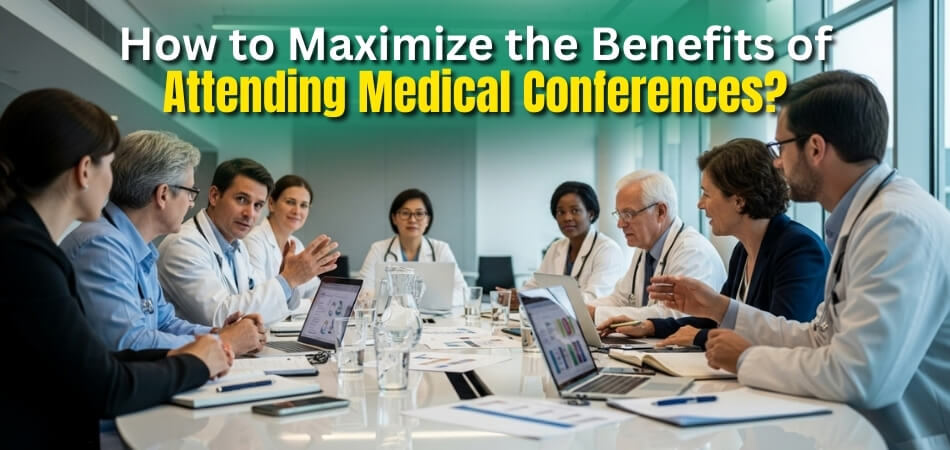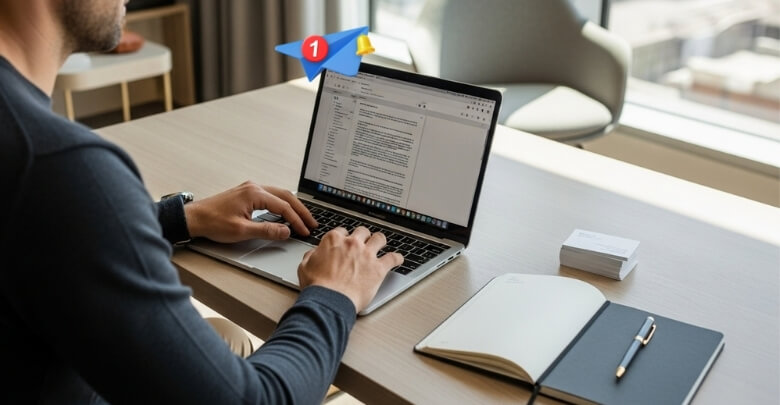Medical conferences are great chances to learn new things, meet experts, and find the latest in healthcare. They bring together doctors, researchers, and companies, all sharing valuable ideas. But simply attending isn’t enough; you need to prepare if you want to get the most from them.
So, how to maximize the benefits of attending medical conferences?
Start by planning your schedule in advance and picking the best sessions and workshops. Use the conference app to stay updated, take clear notes, and ask questions. Be active in discussions and make time to meet new people. After the event, follow up with your contacts and share what you have learned.
Keep reading to see the simple steps that will help you get the most out of every conference.
How to Maximize the Benefits of Attending Medical Conferences?
Medical conferences help doctors and healthcare workers learn new things and share knowledge. They give updates on treatments, tools, and medical research. These events also connect people from different places and specialties. With some planning, you can make every conference more useful and enjoyable.

Plan Ahead for Success
Good planning makes conferences less stressful and more rewarding. Look at the program before you travel. Choose the sessions, workshops, and talks that match your goals. Make time for breaks so you don’t feel rushed.
Planning also means setting limits. Don’t try to attend everything in one day. Pick a few sessions that matter most. A lighter schedule will keep you fresh and ready to learn.
Use Conference Tools Wisely
Most big conferences have mobile apps. These apps show the schedule, maps, and last-minute updates. Download the app early and set reminders for the sessions you want. Notifications keep you on track during busy days.
Some apps even let you connect with other attendees. You can send messages or arrange quick meetings. Use these features to make networking easier. Technology makes conferences simpler to manage.
Engage Actively in Sessions
Listening is helpful, but being active helps more. Choose talks that fit your interests and career path. Take short notes so you remember the best points later. Questions also help you understand the topic better.
Don’t pack your day with too many lectures. Too much information at once makes it hard to focus. Select fewer talks and stay engaged in them. Active learning is better than passive listening.
Network Strategically With Peers
Conferences are a chance to meet new people. Use breaks, lunch, and exhibit halls to introduce yourself. Carry business cards and a simple greeting. Building trust matters more than collecting contacts.
Social media can extend your network. Join the event hashtag on Twitter or LinkedIn. Share your thoughts and connect with other professionals. Networking this way feels natural and effective.
Ask Questions and Participate
Asking questions makes you stand out and helps you learn more. Don’t worry about being perfect; curiosity is welcome. Presenters often share more details when asked. This makes the session more useful for everyone.
Participation also includes group discussions or workshops. Share your views and listen to others. Each exchange adds to your knowledge. Participation builds both confidence and community.
Follow Up After the Conference
Don’t let new contacts fade after the event. Send a quick email or connect on LinkedIn. Thank them for their time and continue the conversation. Following up shows you value the connection.
Review your notes within a few days. Pick the key ideas and share them with colleagues. Sharing helps others learn and reminds you of what you gained. Following up keeps the benefits alive.
Explore Global Learning Opportunities
Medical conferences take place all over the world. The United States, Germany, and Singapore are popular choices. Canada also hosts many events, and conferences in Vancouver are well known for combining learning with culture. Exploring new locations adds both knowledge and life experience.
International conferences also expose you to new ideas. Meeting doctors from different countries shows how others handle medical challenges. This fresh perspective helps you think differently in your own work. Global learning broadens both skills and vision.
Stay Inspired and Motivated
Conferences are not only about learning—they also inspire. Keynote talks and success stories remind you why your work matters. Hearing from leaders gives energy and a new direction. Inspiration helps you return home motivated.
Keep the spark alive by setting one or two small goals. Apply a new skill at work soon. Share inspiring stories with your team to spread energy. Staying motivated after the event creates lasting value.
What are Common Pitfalls to Avoid During Medical Conferences?
Medical conferences offer great chances for learning, networking, and professional growth. But many attendees make mistakes that reduce their benefits. Knowing what to avoid helps you enjoy the event more fully. Staying aware will ensure you return home with both knowledge and new opportunities.
- No Clear Plan: Jumping into a conference without goals wastes time and energy. Create a clear plan so your sessions bring real value.
- Skipping Breaks: Running from one session to another feels tiring. Taking short breaks restores focus and keeps your mind fresh all day.
- Too Many Sessions: Crowding your schedule makes it impossible to remember important details. Choose fewer sessions that matter most and stay engaged.
- Ignoring Networking: Focusing only on lectures closes doors to growth. Networking builds connections that can support collaborations and future opportunities beyond the event.
- Poor Note Taking: Failing to write clear notes limits learning. Capture short points and highlight key ideas to make remembering information easier.
- Avoiding Questions: Keeping quiet during sessions restricts learning. Asking thoughtful questions makes topics clearer and helps you connect with speakers better.
- Missing Exhibits: Walking past the exhibition area means losing new insights. Many innovations and tools are displayed there for hands-on learning.
- No Follow-Up: Leaving contacts unacknowledged after conferences weakens potential partnerships. Follow up quickly with new connections to build strong professional relationships.
What Are the Best Ways to Network Effectively at Medical Conferences?
Medical conferences create valuable opportunities to meet peers, exchange ideas, and build lasting professional relationships. Networking requires preparation, focus, and follow-up to be successful. With the right approach, connections can lead to growth, mentorship, and collaborations. Below are practical strategies to strengthen your networking experience.
Preparation Before the Conference
- Review the attendee and speaker lists to spot the people you’d most like to meet.
- Set clear networking goals, such as finding a mentor, exploring collaborations, or gaining fresh knowledge.
- Update your LinkedIn and social profiles so others see a polished, professional presence.
- Use digital platforms beforehand to introduce yourself and arrange a few meetings in advance.
- Prepare simple conversation starters that make introductions easy and comfortable.
Engagement During the Conference
- Join workshops and structured sessions where conversations flow more naturally.
- Ask thoughtful questions during talks to build visibility and invite follow-up discussions.
- Take advantage of coffee breaks and social gatherings to create relaxed, authentic connections.
- Carry business cards for quick contact exchanges that people can easily remember later.
- Volunteer for event roles to increase visibility and open more networking opportunities.
Using Social Media Effectively
- Post timely updates on LinkedIn or Twitter to share your experience and draw attention.
- Comment on conference news to spark meaningful exchanges with other attendees.
- Follow event hashtags to connect with speakers, groups, and professionals worldwide.
- Share short insights or photos to show enthusiasm and encourage conversations online.
- Add value with helpful resources, such as an ultimate attendance guide for medical conference, to strengthen credibility.
Following Up After the Conference
- Send short, personal follow-up messages that reference specific conversations.
- Connect on LinkedIn to keep professional ties active and communication smooth.
- Arrange quick calls or virtual meetings to continue discussions and explore partnerships.
- Share your notes or key takeaways so others can gain from your insights.
- Use event apps or online platforms to maintain contact long after the event ends.
How Can You Choose the Most Valuable Sessions to Attend?
Medical conferences can feel exciting, but also a little overwhelming at the same time. There are so many sessions happening, and it is tough to decide which ones will matter most. Picking the right ones can make your conference feel more useful. With the right choices, you’ll enjoy learning and leave with real value.
Clear Goals
Start by asking yourself why you are attending the conference. Do you want new knowledge, meet people, or earn credits? Knowing your goals helps you avoid wasting time in random sessions. When your goals are clear, your choices become simple and smart.
Speaker Check
Good speakers can make a session interesting and worth your time. Take a few minutes to learn about them. Find out their experience, background, and what they usually talk about. If their work matches your interest, that session will likely be better for you.
Session Type
Conferences often have different session styles like workshops, panels, or big keynote talks. Each type has a different benefit. Workshops let you practice and learn with real examples. Panels give many viewpoints, while keynote talks share big ideas for everyone.
Right Balance
It’s tempting to attend as many sessions as possible, but that can make you tired. Instead, pick fewer sessions that really matter. Focusing on quality over quantity helps you remember more. You’ll stay fresh and enjoy the event better.
Stay Flexible
Even the best plans sometimes need changes. A friend might suggest a great talk you didn’t notice before. Or you may find something new in the conference app worth joining. Staying flexible helps you catch unexpected opportunities without stress.
Use Tools
Most conferences now have mobile apps or websites with helpful features. These tools show session times, speaker details, and even ratings. You can check updates quickly and make changes if needed. Using these tools saves time and makes planning much easier.
How to Follow Up With Contacts After a Medical Conference?
Meeting people at medical conferences feels exciting and full of new opportunities. But those short introductions mean little without proper follow-up. Staying connected after the event keeps relationships alive and builds stronger professional ties. With simple steps, you can easily keep connections growing.
Thank-you Note
Send a short thank-you message soon after the event. Doing it within a day keeps the connection fresh. Remind them where you met and mention something specific you discussed. This small effort shows you value the meeting and their time.
Personal Touch
Every contact deserves a note that feels personal. Mention parts of your conversation that stood out or mattered most. Personal details make people remember you better. Always keep the tone respectful and professional while still sounding warm.
Add Value
Connections grow when you offer something useful. Share a resource, link, or idea related to your conversation. Showing you can be helpful makes people more interested in staying connected. Stronger ties happen when both sides feel they benefit.
Share Details
Make sure your contact information is easy to find. Add your phone, email, or even attach a simple card. Including a small photo helps them remember who you are. Clear details make it easier for them to reach you later.
Online Connect
Send a quick LinkedIn request after your email. Always add a short note explaining how and where you met. Social platforms are good for keeping conversations active. They also make it easier to follow each other’s work updates.
Next Step
Suggest something simple to continue the talk. It could be a quick call, coffee, or short virtual meeting. Offer flexible options so they can choose what works best. Keeping the conversation moving forward shows interest and commitment.
Extra Context
Sometimes sharing a wider context makes follow-up stronger. You might mention how conferences in other countries bring learning and cultural value. For example, many professionals discuss the benefits of attending medical conference in Vancouver along with other global events. Context adds meaning to the connection.
FAQs About Maximizing the Benefits of Medical Conference Participation
Attending medical conferences is more than just sitting in sessions—it’s about creating long-term value. Many participants often wonder how to make the most of these events. Here are some frequently asked questions with clear answers to guide you.
How Can You Stay Energized During Long Conferences?
Stay hydrated, eat light meals, and take small breaks between sessions. Avoid overloading your schedule with too many talks. Short walks or fresh air can restore focus. Proper rest ensures you remain engaged and attentive throughout the event.
Why Should You Visit Poster Presentations?
Poster sessions provide insights into cutting-edge research from students and professionals. These informal settings allow direct conversations with presenters. Asking questions can deepen understanding. Posters often highlight early ideas that later shape future medical practices and innovations.
How Can You Make Use of Exhibitor Booths?
Exhibit halls showcase the latest medical tools, technologies, and services. Talking to representatives offers hands-on demonstrations and practical insights. Collect information that aligns with your work. Exhibits often reveal solutions you didn’t know could improve clinical or research activities.
What Is the Value of Attending Social Events?
Social events build informal connections in relaxed settings. Conversations outside lecture halls often feel more genuine and memorable. These events encourage meeting people across specialties. Friendships made here can grow into long-term collaborations or helpful professional contacts later.
How Can You Record What You Learn Effectively?
Use a notebook, tablet, or app to capture key points from sessions. Write short summaries instead of long sentences. Highlight action items or resources worth exploring later. Organized notes make reviewing information simple and useful after the conference.
Why Should You Join Smaller Workshops?
Workshops provide hands-on learning in smaller groups. They allow active participation instead of passive listening. Practical exercises strengthen understanding and skills. These sessions are often interactive, giving direct access to experts for questions and discussions about specific topics.
How Can You Share Knowledge After a Conference?
Summarize your notes and prepare a short presentation for colleagues. Share useful resources, contacts, and insights. Posting online can spread your learning further. Sharing ensures your experience benefits others and also reinforces what you personally learned.
What Role Does Reflection Play After Attending?
Taking time to reflect helps identify key lessons and how to apply them. Consider which sessions matched your goals best. Reflection prevents information overload by clarifying priorities. This process turns conference experiences into meaningful actions for career development.
Bottom Lines
Conferences are not just long talks. They give you a chance to learn new things and meet people. You can get more from them if you plan ahead and pick sessions that fit your needs. Try to ask questions and write down simple notes. Also, stay in touch with people you meet after the event.
Knowing how to maximize the benefits of attending medical conferences means focusing on clear steps that are easy to follow. With good planning and small efforts, every conference can help you grow. You can learn and improve in your work.







